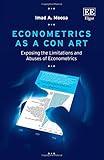Econometrics as a con art : exposing the limitations and abuses of econometrics
Material type: TextPublication details: USA Edward Elgar 2017Description: ix,288p. HardboundISBN:
TextPublication details: USA Edward Elgar 2017Description: ix,288p. HardboundISBN: - 978-1785369940
- 658.4033 MOO
| Item type | Current library | Collection | Call number | Status | Date due | Barcode | |
|---|---|---|---|---|---|---|---|
 Books
Books
|
H.T. Parekh Library | GSB Collection | 658.4033 MOO (Browse shelf(Opens below)) | Available | B2565 |
Recommend by Prof. Surendra Rao /Book well Rs.8055 Inv No.1172/080118/Rs.6041/-
1. The Nature and Evolution of Econometrics
2. Components, Functions and Related Disciplines
3. Econometrics as a Science
4. The Laws of Economics and Science
5. Econometric Analysis: Loopholes and Shortcomings
6. Criticism of Econometrics: Keynes, Leamer, Lucas and the Austrians
7. Stir-Fry Regressions as a Con Job
8. Cointegration Analysis: Principles and Fallacies
9. Cointegration Analysis: Applications and Illustrations
10. Sensitivity and Insensitivity of Empirical Results
11. The Forecasting Fiasco
12. Concluding Thoughts
Imad Moosa challenges convention with this comprehensive and compelling critique of econometrics, condemning the common practices of misapplied statistical methods in both economics and finance. After reviewing the Keynesian, Austrian and mainstream criticisms of econometrics, it is demonstrated that econometric models can be manipulated to produce any desired result. These hazardous analyses may then be relied upon to support flawed policy recommendations, ideological beliefs and private interests. Moosa proposes that the way forward should instead be to rely on clear thinking, intuition and common sense rather than to continue with the reliance upon econometrics. The mathematization of economics has limited the accessibility of and participation in economic discussion by converting the area into a complex `science' when it should not be. Appealing to both academics and practitioners of economics and finance, this book serves to challenge the acceptance of econometrics as offering trustworthy analysis. Any individual interested in empirical work will find this book a captivating read on the limitations of econometrics.
There are no comments on this title.


